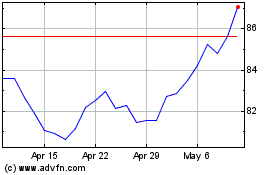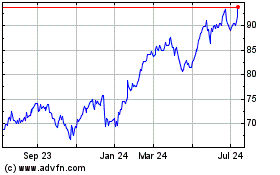2nd UPDATE:New York:Broker Contingent Commissions Likely Early 2010
December 09 2009 - 5:04PM
Dow Jones News
The New York Insurance Department has taken a major step toward
lifting a ban on some insurer-paid commissions for the three
biggest insurance brokers, which could boost their earnings.
The insurance department's proposed Producer Compensation
Transparency regulation imposes transparency rules that require
insurance brokers to tell their customers whether they accept
payments from insurers and if the payments are based on
profitability or business volume, so-called contingent commissions.
The new regulation could go into effect within 45 days. Even if the
regulation goes into effect, the three largest brokers--Aon Corp.
(AON), Marsh & McLennan Cos. (MMC) and Willis Group Holdings
Ltd. (WSH)--would still be banned from taking contingent
commissions because of agreements they all signed with New York's
attorney general and officials in other states, though many expect
those officials to release them from those agreements if the
regulation goes into effect. "If and when the new regulation goes
into effect, we will take whatever action might be appropriate in
light of the change in the law," said an unsigned statement
released by the New York Attorney General's Office Wednesday. The
last step toward adopting the proposed regulation, which spells out
the new disclosure rules for brokers was the publication of the
proposed language on Dec. 2, which means it will could go into
effect 45 days later, in January.
Matthew Gaul, special counsel at the insurance department, said
the office has gone through an extensive comment and revision
process for nearly 18 months, and that the required 45-day period
for public comment is likely the last step before the regulation is
adopted, perhaps with some minor changes.
"We plan to move quickly once we have the authority," he said
Wednesday. He said some broker groups are opposed to the regulation
on the grounds that it will be difficult to implement, but other
broker groups have come to accept it, though are requesting some
minor changes.
Connecticut Attorney General Richard Blumenthal said in a
September interview he was in discussions with the brokers to bring
back a "level playing field," with all brokers following the same
rules. In a phone call Wednesday, Blumenthal said that to his
knowledge, the situation had not yet changed.
Terry Fleming, a board member of the Risk and Insurance
Management Society, which has criticized the commissions, said
recently he expects attorneys general in key states to consider
allowing the commissions for the biggest brokers once the
regulation is adopted.
Keith F. Walsh, an analyst with Citigroup, called the likely
change a "reversing of Spitzer's regulatory regime," referring to
former New York Attorney General Eliot Spitzer, whose investigation
into insurer-paid commissions led to the ban.
Walsh estimated in a note Wednesday that a return of the
commissions could boost earnings per share by as much as 10% for
Aon, Marsh and Willis.
Willis Group Chief Executive Joseph Plumeri has said the broker
will not accept contingent commissions. Plumeri has said the
commissions set up a conflict of interest for brokers, who serve as
advocates for policyholders, but stand to receive an insurer-paid
commission if the policy is more profitable. Shares of Aon closed
up 4 cents cents to $37.92, Marsh closed up 7 cents to $21.61 and
Willis closed up 1 cent to $26.81.
-By Lavonne Kuykendall, Dow Jones Newswires; 312-750-4141;
lavonne.kuykendall@dowjones.com
Brown and Brown (NYSE:BRO)
Historical Stock Chart
From Apr 2024 to May 2024

Brown and Brown (NYSE:BRO)
Historical Stock Chart
From May 2023 to May 2024
